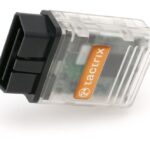Choosing the right OBD2 adapter can be confusing. This article compares the OBDLink LX and MX, highlighting key differences to help you make an informed decision. We’ll cover protocol support, connection type, voltage rating, device compatibility, and wireless security.
OBD-II Protocol Support: LX vs. MX
Both the OBDLink LX and MX boast extensive OBD-II protocol support, ensuring compatibility with a wide range of vehicles. However, the MX+ excels with added support for Ford MS-CAN and GM SW-CAN protocols, broadening its compatibility to include newer domestic vehicles. The LX supports all standard OBD-II protocols, covering most vehicles sold in the US after 1996.
| Feature | OBDLink LX | OBDLink MX+ |
|---|---|---|
| ISO 15765-4 | ✅ | ✅ |
| ISO 14230-4 | ✅ | ✅ |
| ISO 9141-2 | ✅ | ✅ |
| J1850 PWM | ✅ | ✅ |
| J1850 VPW | ✅ | ✅ |
| MS-CAN (Ford) | ✅ | |
| SW-CAN (GM) | ✅ |
Connection Type: Wired vs. Wireless
A key difference between the LX and MX lies in their connection methods. The LX utilizes Bluetooth, offering wireless freedom to move around your vehicle while diagnosing. The MX+ leverages Bluetooth v5.1 LE for a faster and more stable connection.
| Feature | OBDLink LX | OBDLink MX+ |
|---|---|---|
| Bluetooth | ✅ | ✅ |
| Bluetooth Version | v3.0 | v5.1 LE |
Voltage Rating: Ensuring Compatibility
Both adapters are designed for 12V automotive systems, but the MX+ offers enhanced compatibility with 24V systems, making it suitable for heavy-duty vehicles like trucks and buses. The LX is tolerant of momentary voltage spikes up to 24V but is designed for continuous operation on 12V systems.
| Feature | OBDLink LX | OBDLink MX+ |
|---|---|---|
| 12V Systems | ✅ | ✅ |
| 24V Compatible | ✅ | |
| 24V Tolerant | ✅ | ✅ |
Device Compatibility: Android, iOS, and Windows
Both the OBDLink LX and MX+ are compatible with Android and iOS devices. The MX+ extends its compatibility to Windows devices without requiring additional adapters.
| Feature | OBDLink LX | OBDLink MX+ |
|---|---|---|
| Android | ✅ | ✅ |
| iOS | ✅ | ✅ |
| Windows | ✅ | ✅ |
Wireless Security: Protecting Your Data
Security is paramount when dealing with vehicle diagnostics. Both the LX and MX+ offer 128-bit data encryption for secure wireless communication, protecting your vehicle data from unauthorized access.
| Feature | OBDLink LX | OBDLink MX+ |
|---|---|---|
| 128-bit Data Encryption | ✅ | ✅ |
Conclusion: Choosing the Right Adapter
The OBDLink LX is a reliable and affordable option for basic OBD2 diagnostics on most vehicles. The OBDLink MX+, however, offers superior performance, wider protocol support, enhanced voltage compatibility, and seamless Windows connectivity. Choosing between them depends on your specific needs and budget. If you require broader vehicle compatibility, faster data transfer, and the ability to connect directly to Windows devices, the MX+ is the clear winner. If you primarily work with standard OBD2 protocols on 12V vehicles and need a cost-effective solution, the LX is a great choice.

